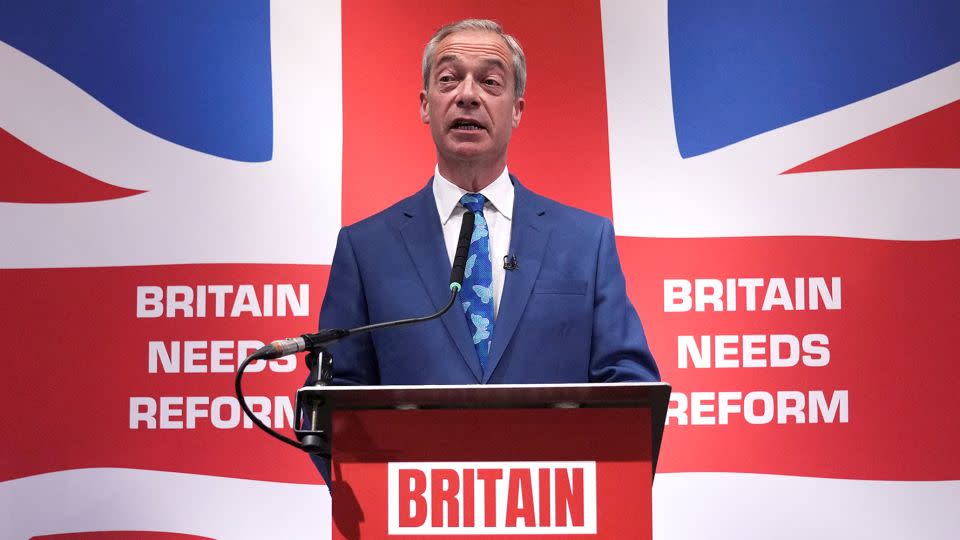Brexit champion Nigel Farage enters UK election race, in more bad news for Sunak’s Conservatives

Nigel Farage, the “architect” of Brexit and a perennially disruptive force in British politics, has announced his intention to stand as a candidate for the hard-right Reform UK party in the country’s July 4 general election.
In an “emergency” press conference Monday, Farage announced he would contest the seat in Clacton, a deprived town on England’s southeastern coast, where Reform has polled well – and that he would take over as leader of the party.
Despite failing to be elected as a Member of Parliament on seven previous occasions, Farage’s candidacy could inject new energy into the Reform campaign and provide another headache for the embattled Prime Minister Rishi Sunak, whose governing Conservative Party has long feared losing voters to the right.
Just last month, Farage had said he would not stand in the general election, and that he would instead “help with the grassroots campaign” to reelect former US President Donald Trump, who was later found guilty by a Manhattan jury of all 34 charges of falsifying business records.
But, speaking from London, Farage said he had begun to change his mind over the weekend. When asked by voters why he was not standing for election, Farage said he gave his “logical, rational reasons for it.”
“But I couldn’t help, after each exchange, I simply couldn’t help feeling that somehow, they felt I was letting them down,” he said. “I have decided. I’ve changed my mind. It’s allowed, you know. It’s not always a sign of weakness.”
Farage has been a disruptive figure in British politics for three decades, transforming the Eurosceptic movement from the fantasy of fringe politicians into the country’s eventual vote to leave the European Union in 2016.
He joined the nascent Reform UK party in 2018, which has since climbed to around 10% in most national polls, bolstered by its opposition to immigration and the government’s net zero plans.
Due to the country’s first-past-the-post electoral system, smaller parties often struggle to translate their national support into parliamentary seats. The problem plagued Farage’s earlier UK Independence Party (UKIP) which, despite securing 12.6% of the vote in the 2015 general election, secured only one seat.
Speaking Monday, Farage said Reform intended to win “millions” more votes than UKIP had during that election, in a bid to make it the UK’s official opposition.
“How many seats in Parliament can we win under this system? That’s another matter,” he said.
Threat to Conservatives
Farage’s candidacy may do more harm to the Conservatives than it does good for Reform. The Conservatives have tried to appeal to more right-wing voters by promising to crack down on immigration, most eye-catchingly by attempting to send asylum seekers to Rwanda.
But, after two years of attempting to implement the policy, Reform have accused the Conservatives of failing to turn their tough rhetoric into results, as net migration figures have continued to climb.
The Conservatives – who trail the opposition Labour Party by more than 20 points in most polls – now face the prospect of hemorrhaging more votes to Reform. While that might not be enough to win Reform more than a few seats, it could contribute to the Conservatives losing dozens more seats to Labour.
Sunak will now face another knotty dilemma, as he tries to hold the Conservatives’ broad but fractious coalition together: does he plow more resources into targeting Reform voters, or does he focus on retaining the support of more moderate Tories.
The Conservatives’ Farage problem will not fade soon. As well as becoming leader, Farage announced he is “coming back for the next five years.”
“We already know that the Conservative Party will be in opposition. But it won’t be the opposition,” he said, raising the spectre that the Conservatives could slide from 14 years in power to a third-place finish in July’s election.
The weaker the Conservative Party is after the election, the more heat Farage can put on them. In opposition, the Conservatives will have to find a new leader and a new direction for the party. There will be internal rows over whether they shift back to the center or follow Farage to the right.
There are as many in the Conservative Party who find Farage appalling as there are who’d like to see him join the party. Whichever wing of the Conservative party wins that internal debate risks seeing the other wing leave the party – and in the case of those on the right of the party, possibly off to join Reform.
What is clear is that Farage still has a unique ability to dominate the political agenda during an election campaign with a single public statement. And it will no doubt be one of the top topics when Sunak and Starmer meet for their first televised debate on Tuesday.
For more CNN news and newsletters create an account at CNN.com


